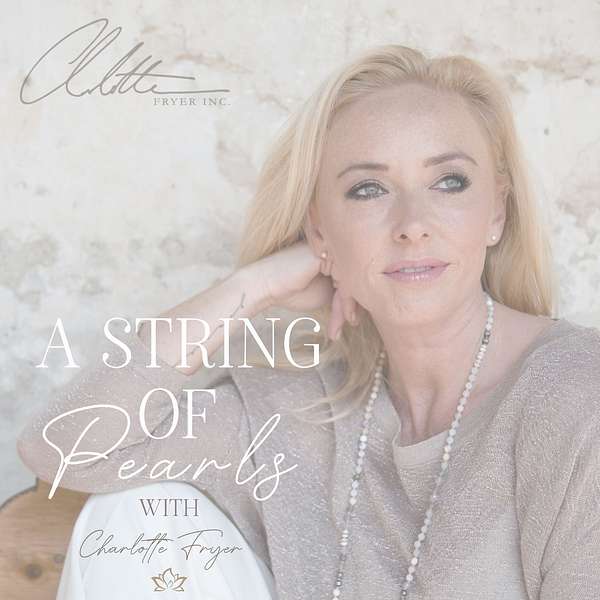
A String of Pearls
A String of Pearls covers a wide range of topics from perception to manifestation, crisis and recovery, soul mates to sacred contracts. These pearls are extracts from conversations I have had over the last 25 years navigating thousands of individuals, couples, families, and professionals through the great tipping points of change and transformation. It is my hope that somewhere in your listening you find a pearl or two that has personal meaning to your journey. May they be strung together to offer an intimate thread of hope, inspiration and comfort as you continue to journey through this often challenging, yet miraculous gift of life.
A String of Pearls
Patience
Use Left/Right to seek, Home/End to jump to start or end. Hold shift to jump forward or backward.
Patience is both a virtue and a practice, and it begins with self love.
00:00:53 Charlotte: Patience is both a virtue and a practice, it's a practice that begins with self-love. Our degree of patience with others and the world is synonymous to our patience with ourself. We are living in a very fast-paced world and a world that through technology has accelerated the speed in which we can attain things, learn things, the model of learning through a linear process, a process that requires one to be present to oneself, that is not obsolete by any degree, but it is not as common, you know, we can very quickly figure out how to do things now, you can just google it, YouTube it, there is sort of an instant shortcut for one of a better metaphor to attaining and achieving an outcome, and due to that, we are unfortunately losing the art of being slow enough with self, where we have this incredible opportunity to feel.
00:02:27 Charlotte: When you think about times in your life when you're being impatient, you know, you want it and you want it now and why is it taking so long, think about what it is that is making you so uncomfortable, what is it that you're looking to relieve yourself off for that particular package to arrive, for that thing to work, what is it that you're running from inside? You'll find that it's what I now refer to as this nondescript time, it's like this, what do I do with myself when I'm not doing... When I'm not connecting with the external world proof of existence, and this traces back, not surprisingly, to childhood.
00:03:39. Charlotte: When working with people who have very little patience for themself, therefore very little patience with others, it's typically because at some level, some degree, somewhere in their developmental years, they were either told or taught or just internally felt that they weren't as competent or as smart or as refined as others, that when they found themselves struggling through learning or having feelings that were more sensitive that got in the way of things being convenient, that that wasn't met with patience, that that wasn't met with kindness, that that wasn't met with the room and the space to do the most simple of anecdotes to um inner frustration and fear and insecurity and that's to just breathe, just breathe, to relax to be okay with yourself.
00:04:50 Charlotte: When we get rigid, then it makes learning very difficult and we shut down and so we become even more discombobulated, and so I have worked with many people who once the layers are peeled back recognise that, "Wow, I'm really hard on myself, I'm really hard on myself because I hold myself to a standard where I feel that if I am not capable of everything, if I'm not self-sufficient therefore don't need anybody else, then I am in some way less than, that in some way I'm not an adult, in some way I'm incompetent." And when you think of being impatient with someone else, it's often, you know, "Oh my God they're idiots," or "Oh my God, why is this taking so long? Why can't they just do this? Like... Argh!"
00:05:56 Charlotte: And... This applies to many many things, the judgments that we have or the reactions that we have towards others is often a mirror to our own inner judgment. What does that sound like? It sounds like, why can't I do this, why aren't I capable of this, why is it that I have to defer and give this job to somebody else that they can't do? When really, that's the self-judgment, and so it's returning to breath, stillness, love and compassion, and ultimately, being willing to be vulnerable, being willing to be vulnerable unto the self first and foremost, and say, "Hey, yeah, I may be not perfect or amazing at this particular thing but, you know, I've got a damn slight better chance of learning and becoming more competent at it if I just slow down, and if I just give myself a break, and if I just encourage myself." It is so important that we rekindle that relationship with the learning process, otherwise, our consciousness as a whole is going to continue to be impaired, so I really appeal to you, to everyone, to think and embody the art of patience as an everyday practice, as starting with the self.